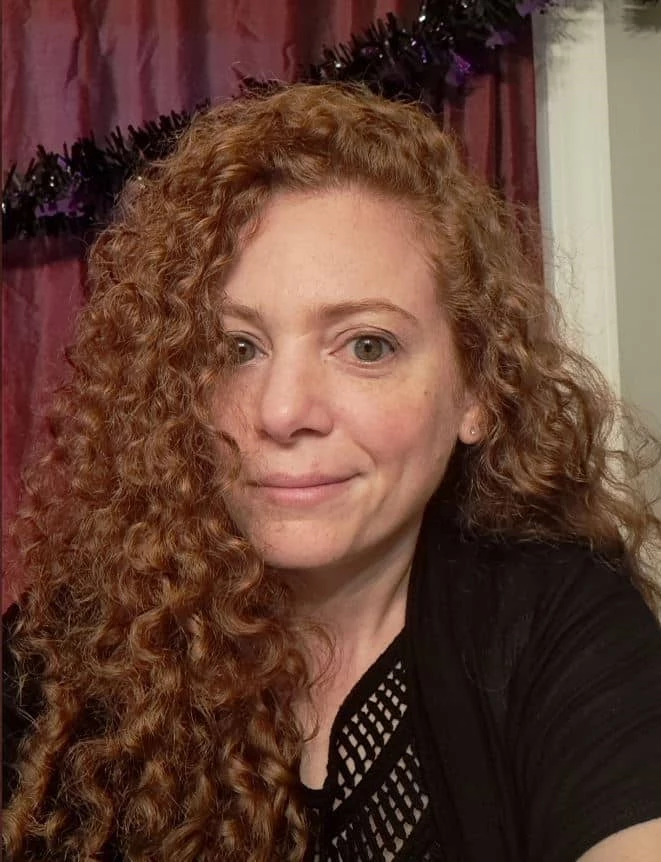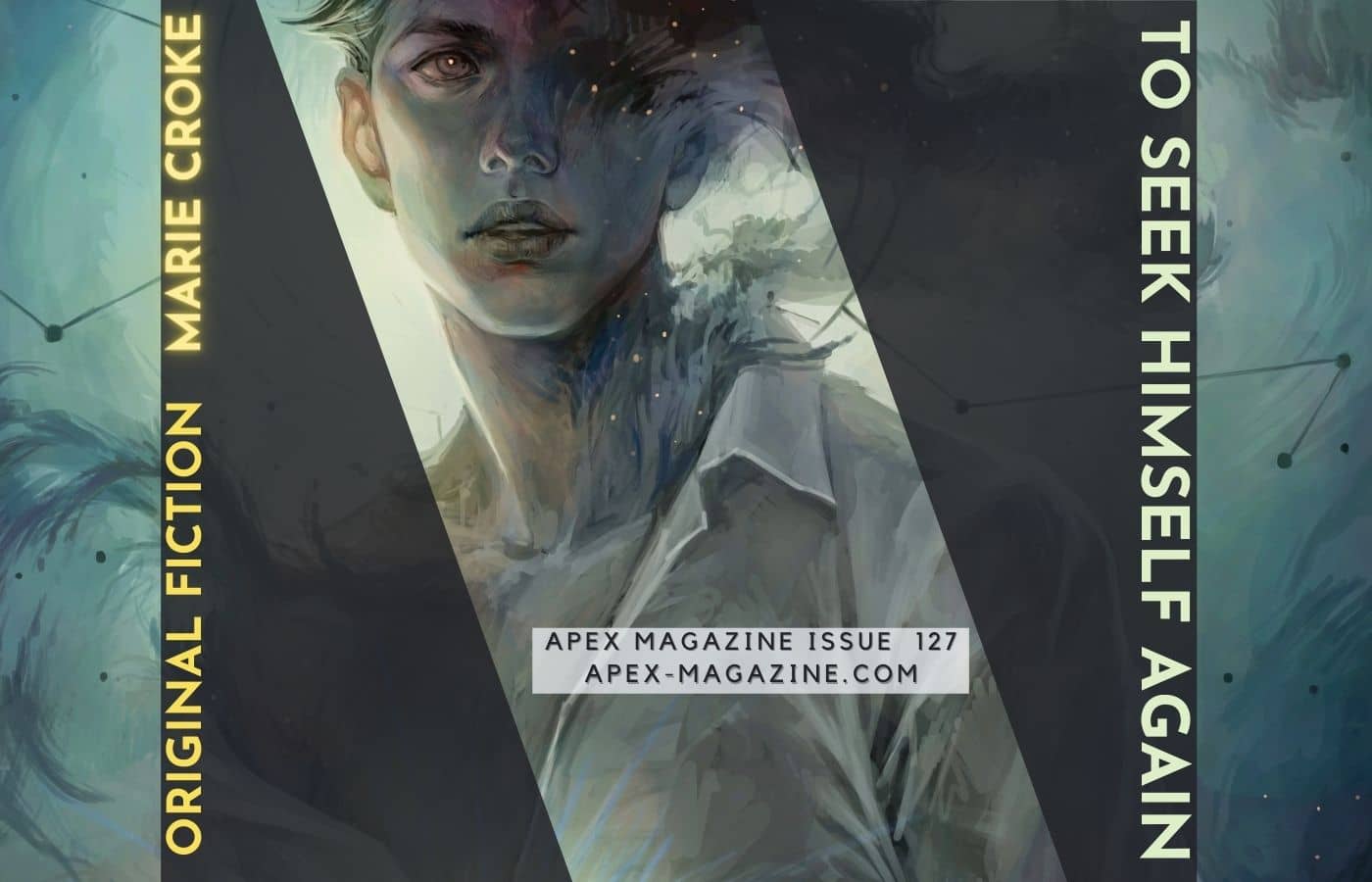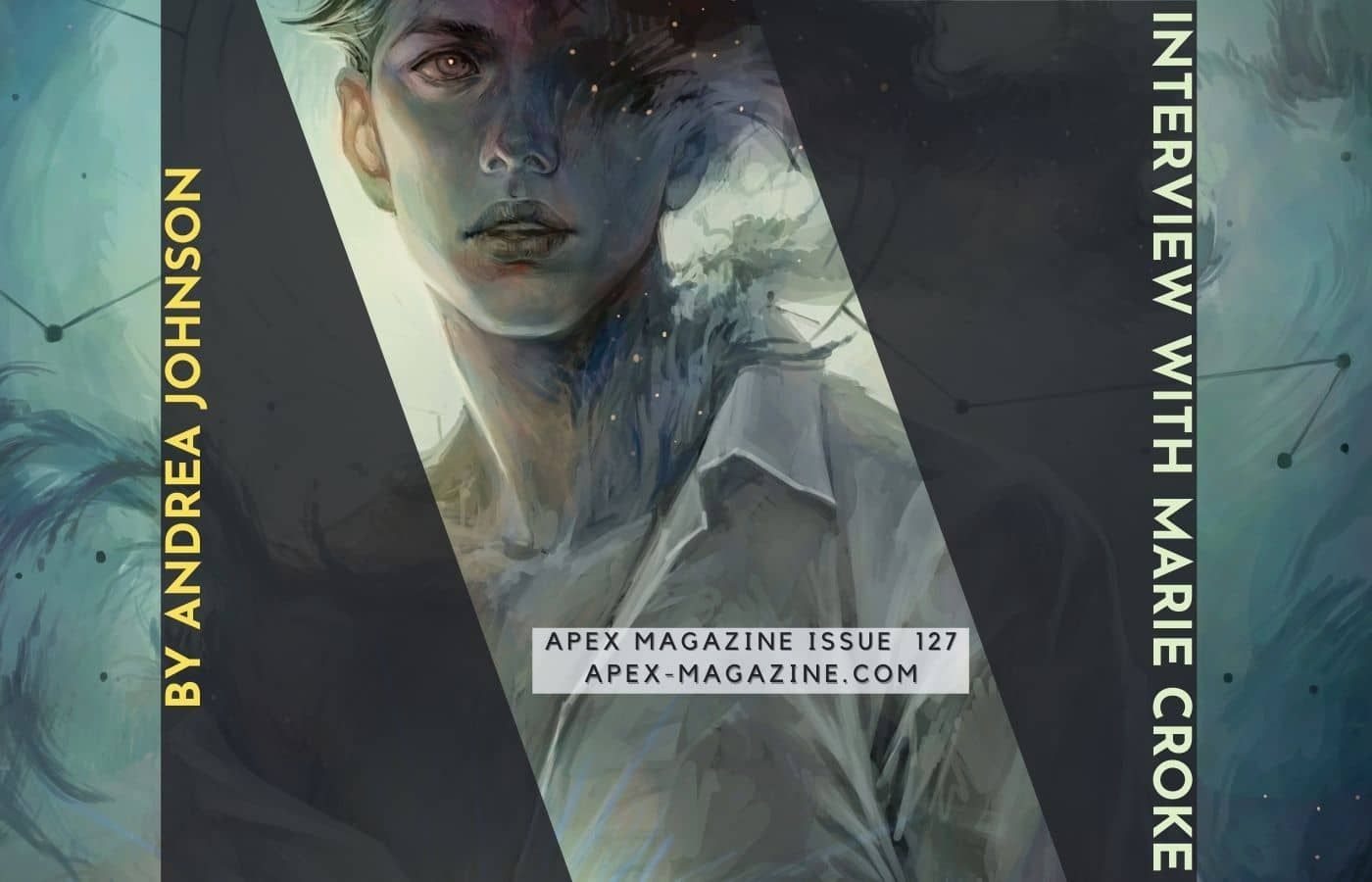
Raise your hand if you use any of the following to express yourself: your style of clothing, your hairstyle, tattoos, or piercings. Now, imagine taking this a few steps further. Imagine swapping out body parts as a way to express yourself. Love swimming? Get some gills. Love birds? Get some wings and feathers. In Marie Croke’s innovative “To Seek Himself Again” people can go to extreme (normal for them) lengths to express their personalities. Change how you feel about something or get interested in a new hobby? You can easily change your body how and when you please. Sure, it’s going to cost you something to swap a body part, but everyone’s got something they aren’t using anymore.
Ah, that must be so freeing! To not have to look a certain way because “that’s how things are” or “that’s what is expected.” What a beautiful world, where people can express themselves however they please and not get followed around by the judgment- or shame-police.
Going the route of a different thought experiment, how attached are you to how you look? If one day you were plopped into an entirely different physical body, would you still be you? I’ll bet everyone has a slightly different answer to that, which is what makes it such a wonderful question. And what about the judgy shame-police, those people who believe we should all look or act a certain way, or dress a certain way, or that only certain people should wear cosmetics or high heels or have short hair.
“To Seek Himself” is the highly imaginative intersection of all this and more.
As you read“To Seek Himself,”I want you to pay attention to which character(s) you relate to. Which character(s) do you feel sympathy for? This story is ripe for deep conversations at someone’s book club, that is for sure!
Marie Croke is a graduate of the Odyssey writers workshop and a winner of the Writers of the Future contest. Her work has appeared or is forthcoming in Cast of Wonders, Dream Forge Magazine, Diabolical Plots, Zooscape, Dark Matter Magazine, and elsewhere. As many short story authors do, Croke spends a lot of time reading the work of others and recommending short stories and novels on her website mariecroke.com. You can also follow her adventures on Twitter, where she is @marie_croke.
Apex Magazine: This story is so wonderfully weird! Where did you get the idea?
Marie Croke:Thank you! I was going for weird!
I watched this video a while ago where adults were asked what they would change about their body and all of them referenced a supposed imperfection on themselves. Then children were brought in and asked the same thing and the responses became magical, referencing changes such as having a mermaid tail or angel wings, which made perfect sense because my own daughter draws pictures of herself and her friends with cat ears and foxtails and bat wings and whiskers.
I loved this idea of modifying ourselves to bemoredifferent to reflect our own passions and personalities rather than less different to create homogenous bodily perfection. And thus, the body-parts tradesman came to life in my mind!
AM: There’s a lot in this story about voluntary body modification and the assumptions that the Lady makes about body modification choices made by Keba and others in the community. What were you thinking about when you were writing this story?
MC:Oh, I was thinking about so much while working on this story! For starters, I maintained in the back of my mind all the comments people have made about my partner’s tattoos, all the disparaging remarks made about my own piercings, all the ones made about the length, cut, or color of my children’s hair, for it’s incredible how invasive the world at large can be at demanding even the most trivial of things about our bodies.
But then you step further, into far more painful territories, into places like woman’s reproductive rights, infant genitalia mutilation, forced sterilizations, and trans rights. The persistent belief some people have that they have the right to direct what happens to bodies that aren’t their own, whether through legislation or cultural stigma or pressure, is insidious and awful. When it’s done in the name of “purity” (a word I actively attempted to turn into a derogative within the story), it really shows a level of narcissism that has permeated belief structures so inherently that oftentimes people can’t see past their own assumptions on what a body should or shouldn’t look like.
AM: What’s with the Lady’s obsession with going back to the way things were? What does she hope to gain from the change?
MC:The lady in the story is never given a name for a reason, so that she can be representative of a culture or world or people (or even a singular person) who insist that your body should meet some set of rules thattheyset down. Her obsession, therefore, is a reflection of an identity that can’t be satisfied unless others are forced into the stringent rules she feels coerced into following. Her own motivations stem from the very belief that what she’s doing is helping; just like the patronizing behavior of people who believe that their idea of what your life (and body) should look like, her behavior exemplifies the misguided hope that she can be a savior to people like Keba.
AM: When Isamelle’s body changes, Isamelle still feels like herself. But Keba doesn’t. He’s convinced he’s not himself anymore. Why do you think Isamelle was okay with the changes, but Keba wasn’t?
MC:Between the three characters, I wanted to show different kinds of identity thinking.
With Keba, his body is a part of his identity and taking away the person he’d crafted himself to be also takes away his own feeling of happiness or satisfaction. With Isamelle, her body isn’t connected with her identity, so taking it away doesn’t hurt her mentally and emotionally in the same way, which I showed early on with her nonchalance at removing her eye.
I wanted to make sure that readers would sense a kinship in one or the other of these two characters, with, of course, the added idea that people with Isamelle’s feelings of identity would understand that not being in pain themselves does not negate the pain others feel at identity disharmony. In other words, just because a law or cultural pressure doesn’t hurt you personally, doesn’t mean you should ignore how it is hurting others.
AM: You did the Odyssey Writer’s Workshop in 2020. What was it like, to do that workshop virtually from the comfort of home? What surprised you the most about your experience at Odyssey?
MC:There were a lot of positives doing Odyssey at home. For one thing, I was able to have my support network there to bolster me through the long six weeks, which was a benefit, especially during those midweeks where exhaustion has set in, yet you still have many grueling days left and many words still to write. I definitely missed getting to chat with a lot of classmates in more lax settings, but the positive side of losing out on those conversations was we also formed a pretty strong bond virtually, leading to us having an easier time remaining in touch outside of the workshop. Many of us still meet every month!
I definitely had a few surprising experiences through Odyssey: having Brandon Sanderson say lovely, lovely things about a story of mine was a personal high; discovering just how much I could learn from my other classmates, all of whom had their own incredible strengths; and learning far more about horror subgenres from J. G. Faherty, which led to my realization that I not only liked the genre but had beenwritingit without realizing.
AM: You answered this question already in a video on theApex Magazineblog, but it’s such a great question that I can’t help but ask it again. You are also a slush reader atApex Magazine. How has reading slush helped you improve your own craft?
MC:Reading slush has helped my writing at a few different levels. The first level is really, truly conceptualizing just how easy it is to lose a reader within the first page or two of a story. Those pages are some of the most important and even though I knew that already, experiencing it over and over in both what-works and what-doesn’t-work examples really cements that lesson.
On a deeper level, slush has given me a much wider understanding about writing to market, or at least, aiming the right kind of story to the right kind of market. It doesn’t matter how good a story is written if it just isn’t going to work for a magazine or has the right qualities that will appeal to a certain editor. This skill, especially, is one I value for it’s allowing me to take my studying further as I study different markets and editorial tastes throughout the industry.
AM: What is your writing process like? Do you plot out your stories, or just start writing and see where the story goes?
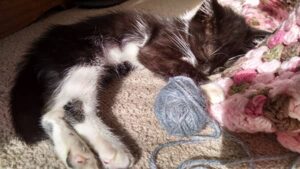
Like many writers, before any work can be started, a cat tax must be paid. Marie pays Miss Thing.
MC:I’m most definitely a planster, that inbetweener that can identify with writers in both the plotting and the let’s-see-where-this-goes panster camps. Generally speaking, I prefer starting with a first line that indicates some world aspect and then discover the character and story as I progress, with a few points during the story where I will stop and brainstorm out the upcoming plot elements and character arcs. Sometimes I’ll have a character voice talking to me, which bleeds into that first line.
I’ve experimented more with plotting before the first word goes on the page, but I discovered some downfalls for my own process doing things that way—first, if I know everything that’s already going to happen, then I lose motivation to write the story, and second, getting that voice, style, and beginning to feel right takes a much longer time with a lot of excess, wasted words. However, writing a story this way still ends up with something I’m proud to submit. So, for me, every story is a little different in how it ended up completed.
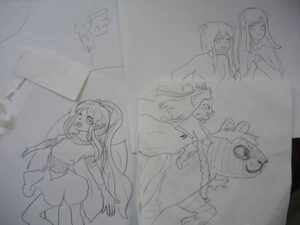
Artwork by Marie Croke’s daughter that helped inspire “To Seek Himself Again.”
AM: On your blog, you offer a lot of book recommendations. What are your favorite types of books to read? What are some recent favorites?
MC:I hesitate to say I have a particular favorite kind of book, but I do have types that I gravitate toward. I’ve never lost my love of the wondrous and different, so I have a heavy preference for stories that do something beyond the industry norms. I prefer lyrical or flowing writing to straightforward. I enjoy puzzles and mysteries and twists that I can’t see coming, yet are obviously inevitable looking back over the story. I adore bittersweet, emotional stories that leave me with a haunting feeling. Stories with found families, mystical forests, fun furry companions, gothic vibes, non-human characters, and murderers on the loose in locked-room situations will all make me want to pick a book up.
A few recent favorites from this year are A. G. Slatter’sAll the Murmuring Bones(a gothic fantasy featuring a family’s twisted relationship with the sea), Joan He’sThe Ones We’re Meant to Find(a climate-change story of the far-flung future that is a tale of a sister’s love), and Sarah Beth Durst’sThe Bonemaker(where a group of older, retired heroes who wield bone-magic must once more save their people despite no longer being in their prime).
AM: Thanks so much, Marie! And I really need to get myself a copy ofThe Ones We’re Meant to Find.









